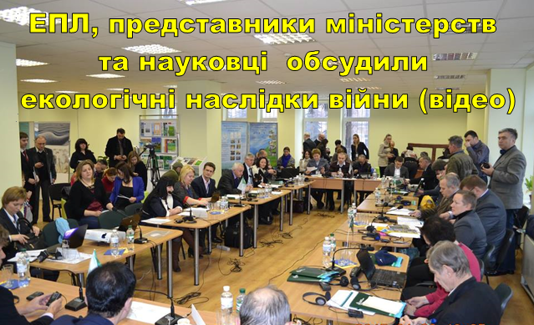On 22 January, in Kyiv, International charitable organization “Environment-People-Law” (EPL) jointly with the Centre for Humanitarian Dialogue held a round-table discussion “Military actions in Ukraine: risks and consequences for the environment and health” that gathered representatives of the state and experts who study consequences of the war in eastern Ukraine for the environment and human health.

– It is for the first time today that we present our studies on environmental situation in the conflict zone in eastern Ukraine. Military actions in the east of the country not only kill its citizens but also ruin its natural treasures, destruct natural environment favorable for human life, “set a time bomb” for future generations, – says Olena Kravchenko, Executive director of EPL. – Termination of the military conflict will become just a beginning of a long rehabilitation of Donbass.
In their studies EPL focused on the following issues:
- flooding of mines and rise of mining waters to the surface, penetration into underground waters;
- destruction of waste water treatment facilities;
- chemical and radiation contamination of water resources;
- pollution of ambient air and soil;
- shell explosions and dispersion of chemical substances;
- destruction of storages of hazardous chemicals, waste, their combustions;
- destruction of landscapes and vegetation;
- massive destruction of forests.
Among others, EPL collected facts about destruction of protected areas in the ATO zone. For example, it has been calculated that the losses incurred by protected areas are worth at least 14 billion UAH. The information about all known consequences of the war for protected areas has been uploaded on the interactive map
https://www.google.com/maps/d/edit?mid=zbSMscEgA8nQ.k3-ikECY7sf0 .
– Speaking about landscapes it is worth mentioning that the most large-scale impact was caused by fires that, according to EPL’s data, destructed17 % of forests and 24 % of steppes in the ATO zone that is 297 000 ha. There were by 15 times more fires than in the same period in 2013, which totally makes about 3000 fires, comments EPL’s environmentalist Kateryna Norenko. – Majority of new negative environmental phenomena in Donbass are direct consequences of the military actions.
– Having visited the ATO zone, EPL have done analysis of samples of soil. Results of the analysis show high concentrations of heavy metals at the locations of shell explosions. Concentration of titanium in soil samples taken from places of shell explosions by 150 times exceeds background levels. Concentration of sulfates is by 2.5 times higher, there are excessive concentrations of vanadium, lead and cadmium. It is important to mention that alloys of titanium and vanadium are used in aviation and rocket engineering, – adds EPL’s environmentalist Alla Voytsikhovska.
Military actions in eastern Ukraine causes harm to all spheres. Both regions are on the edge of environmental, technogenic and sanitary catastrophe. The situation needs immediate actions for detecting technogenic environmental problems caused by the war and development of technology of their overcoming. Thus, participants of the round-table developed a list of recommended immediate actions to be undertaken by public authorities.
Video recordings of all presentations are available at the following links:
Welcome speech: David Gorman
Welcome speech: Yevhen Yakovliev
Yevhen Yakovliev
Oleksiy Vasyliuk
Sophia Shutiak
Oksana Nahorna
Serhiy Chumachenko
Vasyl Karabyn
Alla Voytsikhovska
Inha Uriadnykova
Oleh Tsaruk
Alla Voytsikhovska
Kateryna Norenko
Ihor Shevchenko, the minister of environment and natural resources of Ukraine http://youtu.be/I4xO0zHb2os
For further information please contact:
Olena Kravchenko, EPL Executive director
Email: okravchenko@epl.org.ua, tel.: (032) 225 – 76 – 82
Oleksiy Vasyliuk, EPL environmentalist
Email: vasyliuk@gmail.com, tel.: (097) 100 – 04 -73
Kateryna Norenko, EPL environmentalist
Email: kateryna.norenko@gmail.com, tel.: (032) 225 – 76 – 82
Alla Voytsikhovska, EPL environmentalist
Email: alla.voytsyhovska@gmail.com, tel.: (032) 225 – 76 – 82

